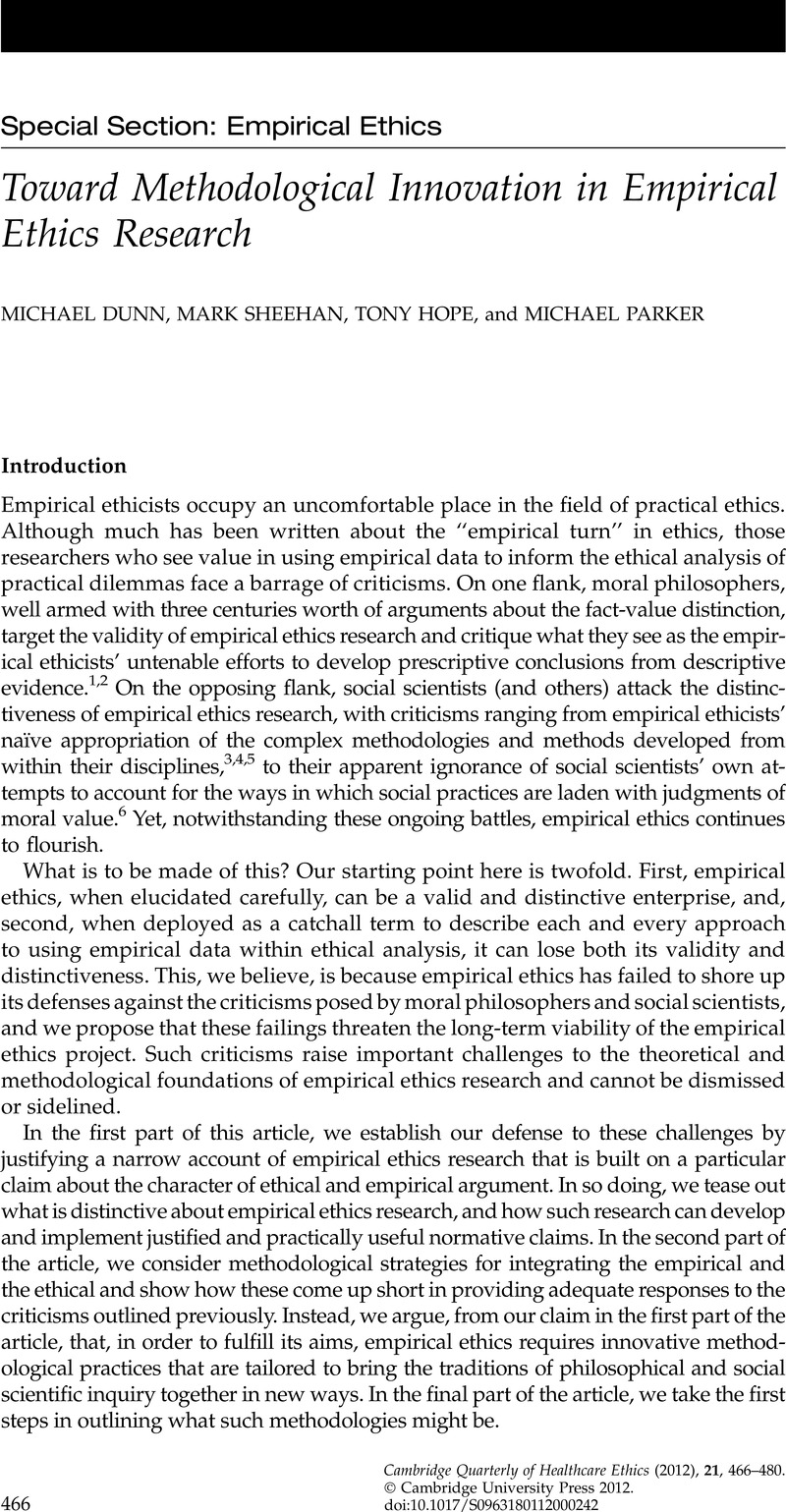Published online by Cambridge University Press: 24 July 2012

1. Harris, J. The scope and importance of bioethics. In: Harris, J, ed. Bioethics. Oxford: Oxford University Press; 2001:1–24.Google Scholar
2. Garrard, E, Wilkinson, S. Mind the gap: The use of empirical evidence in bioethics. In: Hayry, M, Takala, T, Herissone-Kelly, P, eds. Bioethics and Social Reality. Amsterdam: Rodopi; 2005:77–92.Google Scholar
3. Ashcroft, RE.Futures for bioethics? Bioethics 2010;24:ii.CrossRefGoogle ScholarPubMed
4. Hedgecoe, AM.Critical bioethics: Beyond the social science critique of applied ethics. Bioethics 2004;18:120–43.CrossRefGoogle ScholarPubMed
5. Hurst, SA.What “empirical turn in bioethics”? Bioethics 2010;24:439–44.CrossRefGoogle ScholarPubMed
6. Hedgecoe, AM. Medical sociology and the redundancy of empirical ethics. In: Ashcroft, RE, Dawson, A, Draper, H, McMillan, J, eds. Principles of Healthcare Ethics. 2nd ed. Chichester, West Sussex: Wiley; 2007:167–76.Google Scholar
7. De Vries, R, Stanczyk, A, Wall, IF, Uhlmann, RA, Damschroder, L, Kim, SYH.Assessing the quality of democratic deliberation: A case study of public deliberation on the ethics of surrogate consent for research. Social Science and Medicine 2010;70:1896–903.CrossRefGoogle ScholarPubMed
8. Kim, SYH, Wall, IF, Stanczyk, A, De Vries, R.Assessing the public’s views in research ethics controversies: Deliberative democracy and bioethics as natural allies. Journal of Empirical Research on Human Research Ethics 2009;4:3–16.CrossRefGoogle ScholarPubMed
9. Lenaghan, J, New, B, Mitchell, E.Setting priorities: Is there a role for citizens’ juries? British Medical Journal 1996;312:1591–3.CrossRefGoogle Scholar
10. Wainwright, P, Gallagher, A, Tompsett, H, Atkins, C.The use of vignettes within a Delphi exercise: A useful approach in empirical ethics? Journal of Medical Ethics 2010;36:656–60.CrossRefGoogle ScholarPubMed
11. Haimes, E.What can the social sciences contribute to the study of ethics? Theoretical, empirical and substantive considerations. Bioethics 2002;16:89–113.CrossRefGoogle Scholar
12. It is important to note that this (analytic philosophical) account of the convincingness of arguments is open to dispute. This is of particular importance here because many of the most well-established ways of justifying the theoretical and methodological foundations of empirical ethics research begin by taking issue with such an account. We reflect briefly on the relationship between our analysis of the value of empirical ethics and the approaches emanating from alternative philosophical traditions in ethics in the conclusions of the article.
13. Sheehan, M. Moral relativism. In: Ashcroft, RE, Dawson, A, Draper, H, McMillan, J, eds. Principles of Healthcare Ethics. 2nd ed. Chichester, West Sussex: Wiley; 2007:93–8.Google Scholar
14. Wiggins, D.Moral cognitivism, moral relativism and motivating moral beliefs. Proceedings of the Aristotelian Society 1990;91:61–85.CrossRefGoogle Scholar
15. See note 2, Garrard, Wilkinson 2005.
16. Rawls, J.A Theory of Justice. 2nd ed.Cambridge, MA: Harvard University Press; 1999.Google Scholar
17. Scanlon, TM. Rawls on justification. In: Freeman, S, ed. The Cambridge Companion to Rawls. Cambridge: Cambridge University Press; 2002:139–67.CrossRefGoogle Scholar
18. van Delden, JJM, van Thiel, GJM. Reflective equilibrium as a normative-empirical model in bioethics. In: van den Burg, W, van Willigenburg, T, eds. Reflective Equilibrium: Essays in Honour of Robert Heeger. Dordecht: Kluwer; 1998:251–9.Google Scholar
19. van der Burg, W, van Willigenburg, T, eds. Reflective Equilibrium: Essays in Honour of Robert Heeger. Dordecht: Kluwer; 1998.Google Scholar
20. McMillan, J, Hope, T. The possibility of empirical psychiatric ethics. In: Widdershoven, G, McMillan, J, Hope, T, van der Scheer, L, eds. Empirical Ethics in Psychiatry. Oxford: Oxford University Press; 2008:9–22.CrossRefGoogle Scholar
21. Dunn, M, Ives, J.Methodology, epistemology and empirical bioethics research: A constructive/ist commentary. American Journal of Bioethics 2009;9:93–5.CrossRefGoogle ScholarPubMed
22. Molewijk, B, Stiggelbout, AM, Otten, W, Dupuis, HM, Kievit, J.Empirical data and moral theory: A plea for integrated empirical ethics. Medicine, Health Care and Philosophy 2004;7:55–69.CrossRefGoogle ScholarPubMed
23. Widdershoven, GAM.How to combine hermeneutics and wide reflective equilibrium? Medicine, Health Care and Philosophy 2007;10:49–52.CrossRefGoogle ScholarPubMed
24. Carter, SM.Beware dichotomies and grand abstractions: Attending to particularity and practice in empirical bioethics. American Journal of Bioethics 2009;9:76–7.CrossRefGoogle ScholarPubMed
25. See note 21, Dunn, Ives 2009, at 94.
26. Ives, J, Draper, H.Appropriate methodologies for empirical bioethics: It’s all relative. Bioethics 2009;23:249–58.CrossRefGoogle ScholarPubMed
27. Parker, M.Ethnography/ethics. Social Science and Medicine 2007;65:2248–59.CrossRefGoogle ScholarPubMed
28. Dunn, M, Clare, ICH, Holland, AJ.Substitute decision-making for adults with intellectual disabilities living in residential care: Learning through experience. Health Care Analysis 2008;16:52–64.CrossRefGoogle ScholarPubMed
29. Ives, J, Dunn, M.Who’s arguing? A call for reflexivity in bioethics. Bioethics 2010;24:256–65.CrossRefGoogle Scholar
30. Widdershoven, G, van der Scheer, L. Theory and methodology of empirical ethics: A pragmatic hermeneutic perspective. In: Widdershoven, G, McMillan, J, Hope, T, van der Scheer, L. Empirical Ethics in Psychiatry. Oxford: Oxford University Press; 2008:23–36.CrossRefGoogle Scholar
31. Lindemann, H, Verkerk, M, Urban Walker, M.Naturalized Bioethics: Toward Responsible Knowing and Practice. Cambridge: Cambridge University Press; 2009.Google Scholar
32. See note 22, Molewijk et al. 2004.
33. Widdershoven, G, Abma, T, Molewijk, B.Empirical ethics as dialogical practice. Bioethics 2009;23:236–48.CrossRefGoogle ScholarPubMed
34. Widdershoven, G, Molewijk, B, Abma, T.Improving care and ethics: A plea for interactive empirical ethics. American Journal of Bioethics 2009;9:99–101.CrossRefGoogle ScholarPubMed
35. Frith L. Symbiotic empirical ethics: A practical methodology. Bioethics 2012;26:198–206.
36. Molewijk, AC, Abma, T, Stolper, M, Widdershoven, G.Teaching ethics in the clinic: The theory and practice of moral case deliberation. Journal of Medical Ethics 2008;34:120–4.CrossRefGoogle ScholarPubMed
37. See note 33, Widdershoven, Abma, Molewijk 2009.